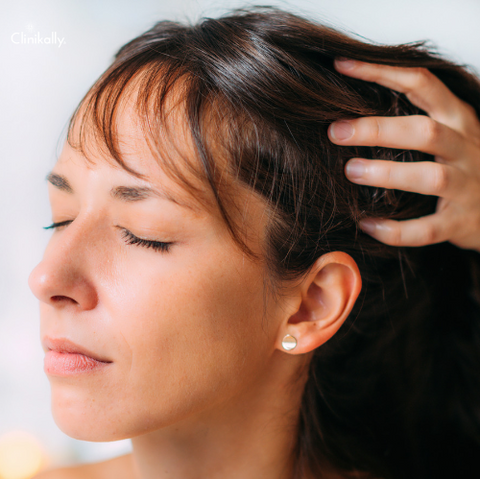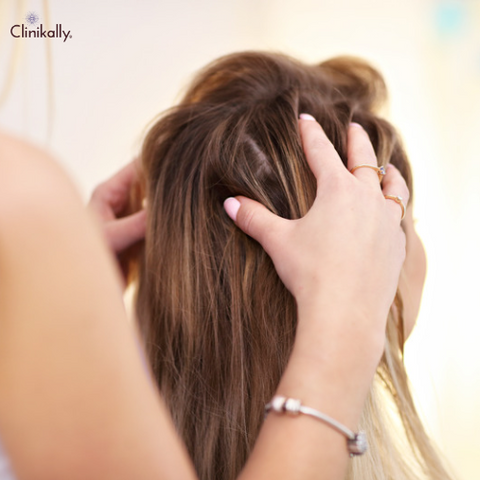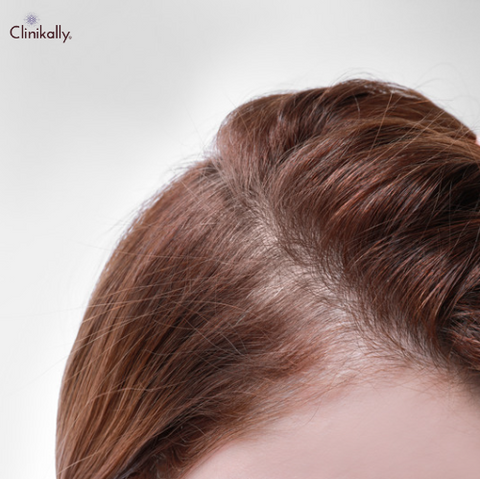Oranges, lemons, and grapefruits, among other citrus fruits, contain the natural chemical limonene in their peels. Due to its possible advantages for hair health and appearance, it is also a frequent ingredient in many hair care products. Limonene has the potential to improve the health and look of hair when used as an ingredient in hair care products. You can profit from the properties of this natural substance for nourished, healthy, and beautiful hair by utilising it safely and responsibly.
What is Limonene and How Does it Benefit Hair?

The peels of citrus fruits, including lemons, oranges, and grapefruits, frequently contain limonene, a natural substance. It is a terpene, which is an organic molecule that is frequently used in solvents, flavours, and scents. Due to its potential advantages for the health and look of hair, limonene is also used in hair care products. The following are a few of the ways limonene can help hair:
-
Dandruff treatment: Because limonene has antifungal and antibacterial properties, it is effective in treating dandruff and other scalp conditions. It can support a healthy scalp by eradicating dandruff-causing microorganisms.
-
Cleaning the scalp: The natural solvent limonene can remove buildup and excess oils from the hair and scalp. This can lessen the chance of an irritated scalp and clogged hair follicles by keeping the scalp clean.
-
Hair elasticity and strength: Limonene may help make hair more elastic and stronger, which can lessen hair breakage and split ends. This may lead to hair that is less prone to damage and has a healthier appearance.
-
Moisture retention: Limonene can help condition and moisturise the hair, giving it a soft, smooth, and healthy appearance and feel. People with dry or damaged hair may find this to be especially helpful.
-
Fragrance: Limonene has a pleasant citrus scent, which makes it a popular ingredient in hair care products to provide a fresh and clean fragrance.
Limonene is a versatile and beneficial ingredient in hair care products that may improve hair health and appearance.
Limonene as a Natural Hair Nourishing and Growth-Promoting Ingredient
The natural chemical limonene is found in the peels of citrus fruits such as oranges, lemons, and grapefruits. It is also frequently included as a component in many hair care products due to its potential benefits for hair health and growth. Here are several ways that limonene can nourish and encourage hair growth:
-
Scalp health: Limonene has antifungal and antibacterial properties that can aid in the treatment of scalp conditions like dandruff, itching, and inflammation. A healthy scalp is necessary for hair growth.
-
Promotes blood flow: Because limonene is a vasodilator, it can boost blood flow to the scalp. It may be possible to encourage hair growth by improving blood flow to the hair follicles.
-
Antioxidant properties: Limonene has antioxidant properties that can shield hair from environmental deterioration, including pollution and UV radiation, which can make hair dry, brittle, and prone to breakage.
-
Moisturizes hair: Limonene can help to moisturise and hydrate the hair, preventing dryness and breakage, and leaving it looking shiny and healthy.
-
Strengthens hair: Limonene can help make hair stronger and more elastic, which can help to prevent split ends and hair breakage. This may lead to hair that is less prone to breakage and damage and has a healthier appearance.
Limonene and Its Effects on Hair Health and Repair
The peels of citrus fruits like oranges, lemons, and grapefruits contain limonene, a naturally occurring chemical. It has been discovered to have potential advantages for maintaining and repairing hair. Here are a few ways limonene can help maintain healthy hair:
-
Limonene has antioxidant properties that can aid in defending hair against environmental harm, such as UV radiation and pollution. This will keep your hair from becoming dry, brittle, and prone to breakage.
-
Limonene is a vasodilator, which means it can improve blood circulation to the scalp and promote hair growth. By increasing blood flow to the hair follicles, hair growth can be promoted.
-
Limonene has moisturising properties, which can help to hydrate and soften the hair. This can help prevent dryness and breakage while also leaving hair looking shiny and healthy.
-
Limonene can help strengthen the hair, reducing breakage and split ends. This can result in healthier-looking, less-prone-to-damage hair.
-
Limonene has anti-inflammatory properties, which can help reduce inflammation on the scalp, preventing hair loss and promoting hair growth.
Limonene can help improve hair health and repair by protecting it from damage, encouraging growth, moisturising it, strengthening it, and reducing inflammation. It is a natural and safe ingredient found in many hair care products. By including limonene in your hair care routine, you can achieve nourished, healthy, and beautiful hair.
The Potential Benefits of Limonene for Hair Strengthening and Texture Improvement

Limonene is a natural compound found in citrus fruits that is commonly used in hair care products due to its potential benefits for strengthening and improving hair texture. The following are some of the ways limonene can help improve hair texture and strength:
-
Moisturizes hair: Limonene has moisturising properties that can help to hydrate and soften the hair. This can prevent dryness and breakage, which can improve hair texture.
-
Strengthens hair: Limonene can contribute to hair strength, preventing split ends and hair breakage. This may lead to hair that is less prone to breakage and damage and has a healthier appearance.
-
Increases hair elasticity: Limonene may help to increase hair elasticity, which may help to lessen hair breakage and enhance texture.
-
Reduces frizz: Limonene can assist in reducing frizz by gliding the hair cuticle, which can enhance the texture of the hair.
-
Enhances shine: Limonene can contribute to improving the sheen of hair, giving it a healthy, radiant appearance.
Your hair will look healthier and be less prone to breakage and damage if you include limonene in your hair care regimen. It can also help strengthen the hair. It is a typical ingredient in hair care products and is natural and secure, making it a great option for people looking to enhance the health and appearance of their hair.
Limonene and Its Role in Strengthening Hair from Root to Tip
A natural substance called limonene, which is present in citrus fruits, can strengthen hair from root to tip. Here are some ways that limonene can strengthen hair:
-
Increases blood flow to the scalp: Because limonene is a vasodilator, it can increase blood flow to the scalp. The hair follicles may receive vital nutrients from the increased blood flow, which may encourage the growth of thicker hair.
-
Antioxidant protection: Limonene can shield the hair from environmental harm due to its antioxidant properties. This can keep the hair strong and healthy while preventing damage to the hair shaft.
-
helps to balance the scalp: Limonene has antibacterial and antifungal properties that can help balance the scalp's microbiome. A healthy scalp promotes healthy hair growth and helps prevent breakage.
-
Reduces inflammation: Limonene has anti-inflammatory properties that can aid in the reduction of inflammation on the scalp. Inflammation can weaken and break the hair, so reducing inflammation can help keep it strong.
-
Reduces breakage and split ends: Limonene can help strengthen the hair shaft and prevent breakage. This can result in stronger hair from root to tip.
Limonene has the potential to strengthen hair from root to tip. It can increase blood flow to the scalp, protect against free radicals, balance the scalp's microbiome, reduce inflammation, and prevent breakage. By including limonene in your hair care routine, you can achieve stronger, healthier-looking hair.
Limonene and Its Impact on Hair Texture and Moisture
Limonene has been shown to improve hair texture and moisture. Here's how it's done:
-
Improves moisture retention: By sealing the hair cuticle, limonene can aid in improving the hair's inherent ability to retain moisture. This can stop moisture from evaporating, which can cause dullness, breakage, and dryness.
-
Restores hair elasticity: Limonene has the ability to improve hair texture by restoring hair elasticity. The ability of the hair to stretch without breaking makes elasticity essential. Elastic hair can maintain its shape and bounce while being less likely to break.
-
lowers hair porosity: Limonene can aid in lowering hair porosity, which can enhance moisture absorption. High-porosity hair can become brittle and more prone to breakage if it absorbs too much moisture. Porosity can be reduced with the aid of limonene, preventing excessive moisture absorption.
-
Enhances hair softness: Limonene has emollient qualities that can make the hair softer and easier to manage. Soft hair can have a healthier-looking and more appealing texture because it is simpler to comb through, style, and maintain.
The moisture and texture of your hair can be enhanced by adding limonene to your hair care regimen. Limonene can increase hair softness, decrease hair porosity, restore hair elasticity, and improve moisture retention. These advantages may lead to hair that is stronger, healthier-looking, and simpler to manage and style.
Understanding the Safety and Efficacy of Limonene in Hair Care Products

When used in proper amounts, limonene is usually regarded as safe for use in hair care products. Because of its potential benefits for hair care and its pleasant citrus aroma, it is a natural substance that is commonly used in the cosmetics sector. It's crucial to keep in mind, though, that some individuals might be sensitive to limonene and have skin rashes or allergic reactions when exposed to it. Numerous organisations, including the European Union (EU) Scientific Committee on Consumer Safety and the Cosmetic Ingredient Review (CIR) Expert Panel, control the amount of limonene used in hair care products.
While the EU has limited its usage to a maximum concentration of 0.1% in leave-on products and 5% in rinse-off products, the CIR Expert Panel has determined that limonene is safe for use in hair care products at concentrations up to 5%. Limonene has a number of possible advantages when used in hair care products, including better moisture retention, greater softness, and reinforced hair from root to tip. It's crucial to remember that the concentration of limonene used and other components used in the formulation could both affect how effective limonene is in hair care products.
Research on Limonene and Its Effects on Hair Health and Safety
There is little information specifically on limonene's effects on hair health, but some studies have looked into its potential advantages for skin health and safety. Here are some results:
-
Effects on inflammation: Limonene has been demonstrated to have anti-inflammatory properties, which may be advantageous for the scalp. In one study, it was discovered that limonene decreased the inflammation of skin cells in vitro, and it was recommended as a potential treatment for inflammatory skin conditions.
-
Antimicrobial activity: Limonene has demonstrated antimicrobial activity against a range of bacteria and fungi, including those that can cause scalp conditions such as dandruff and seborrheic dermatitis. In one study, it was discovered that using a shampoo with limonene for four weeks significantly reduced dandruff.
-
Safety: Although limonene is generally regarded as safe for use in cosmetic products, some studies have suggested that it may cause skin irritation or allergic reactions in some people. According to one study, limonene is a relatively common cause of allergic contact dermatitis, which is characterised by redness, itching, and swelling of the skin.
While there has been little research specifically on the effects of limonene on hair health, its potential anti-inflammatory and antimicrobial properties suggest that it may be beneficial for the scalp and overall hair health. However, as with any cosmetic ingredient, it's critical to follow the manufacturer's instructions, patch test the product before use, and seek medical advice if you have any adverse reactions.
The Importance of Ingredient Safety and Product Formulation in Hair Care
When selecting hair care products, ingredient safety and product formulation are crucial things to take into account. It's critical to choose hair care products with safe and effective components because they can have a big impact on both the health of your hair and your personal wellness. Ingredients that are unsafe or can be toxic might cause hair damage, allergic reactions, and itchiness on the scalp. For instance, sulphates and parabens, two substances frequently found in hair care products, have been connected to hair dryness, breakage, and other detrimental impacts on hair health. Additionally, some substances, including phthalates, which have been linked to reproductive and developmental problems, may be harmful to a person's health.
The formulation of the product is also essential for guaranteeing the security and effectiveness of hair care products. The amount of each ingredient and how they are combined can affect how well a product works and how it interacts with the scalp and hair. For instance, some ingredients might be more effective when combined with other ingredients, but other ingredients might be less effective or even dangerous when combined. The manufacturing procedures and processes used can also have an impact on the safety and quality of hair care products. Products made with ethical and sustainable methods, such as avoiding animal testing and utilizing renewable energy sources, may be a more responsible and conscientious choice.
Incorporating Limonene into Your Hair Care Routine

Here are some suggestions for incorporating limonene into your hair care routine:
-
Look for limonene-containing products: Limonene is a common ingredient in hair care products like shampoos, conditioners, and hair oils. Look for limonene in the ingredient list of products. It is also critical to ensure the product is made with safe and effective ingredients.
-
Consider using limonene-based DIY hair treatments: Limonene can also be used in homemade hair treatments such as masks and rinses. Apply a few drops of limonene to your hair and scalp along with a carrier oil such as coconut oil or olive oil. Allow it to sit for a few hours or overnight before rinsing with warm water and shampooing as usual.
-
Patch test before use: Before using any limonene-containing product, perform a patch test to rule out any allergic reactions or irritation. Apply a small amount of the product to the inside of your wrist or elbow and wait 24 to 48 hours to see if any reaction occurs.
-
Use as directed: When using limonene-based products or DIY treatments, follow the instructions on the product label or the recipe. Overuse or misuse of any hair care product can lead to hair damage and other negative effects.
-
Be patient: Like any other hair care ingredient, limonene may take some time to show its benefits. Consistent use and patience are essential for achieving the best results.
Always seek the advice of a healthcare professional or dermatologist before making major changes to your hair care routine, especially if you have any underlying scalp conditions or allergies.
The Best Ways to Use Limonene for Nourished, Healthy, and Beautiful Hair
Some of the best ways to use limonene for nourishing, healthy, and beautiful hair are as follows:
-
Shampoos and conditioners containing limonene should be used: Look for limonene in the ingredient list of hair care products. Limonene can help strengthen and nourish hair while also stimulating growth.
-
Apply limonene hair oil: Limonene hair oil can help to hydrate and nourish the hair while also promoting hair growth. Apply a few drops of limonene to your hair and scalp along with a carrier oil such as coconut oil or olive oil. Leave it on for a few hours or overnight, then rinse it off with warm water and shampoo as usual.
-
Use limonene-based hair masks: A limonene hair mask can help nourish and repair the hair, leaving it healthy and shiny. Apply a few drops of limonene to your hair along with other hair-nourishing ingredients such as avocado or eggs. Allow it to sit for 20-30 minutes before rinsing with warm water and shampooing as usual.
-
Add a few drops of limonene to your hair rinse: Adding a few drops of limonene to your hair rinse can help promote hair growth while also leaving your hair smelling fresh and citrusy. Simply combine a few drops of limonene with water, apply it to your hair after shampooing, and rinse with warm water.
-
Incorporate limonene into your diet: Consuming limonene-rich foods, such as citrus fruits, can also help nourish your hair from within.
Before using any limonene-containing product, always perform a patch test, especially if you have sensitive skin. For the best results, it's crucial to follow the directions on limonene-based products and to be patient.
Common Hair Care Products that Contain Limonene and Alternatives to Consider
Shampoos, conditioners, and hair oils, in particular, frequently contain the ingredient limonene. The following are a few popular hair care items that might contain limonene:
-
Shampoos and conditioners: Many hair care companies use limonene in their shampoos and conditioners due to its nourishing and purifying properties.
-
Hair oils: Because of their ability to penetrate the hair shaft and provide deep hydration and nourishment, limonene is frequently found in hair oils.
-
Styling products: Some styling products, such as hair sprays, gels, and mousses, may contain limonene to provide a pleasant scent and help hold hairstyles in place.
If you are looking for alternatives to limonene-containing hair care products, consider products that use other natural ingredients with similar benefits, such as:
-
Rosemary oil: Research suggests that rosemary oil can thicken and improve the texture of hair while also promoting hair growth.
-
Peppermint oil: Peppermint oil can aid in calming and soothing the scalp while also promoting thicker, longer hair.
-
Lavender oil: In addition to having calming effects, lavender oil can also help encourage hair growth and stop hair loss.
-
Aloe vera: Aloe vera is a natural humectant, which means it helps to hydrate and nourish hair by drawing moisture into it.
-
Coconut oil: Coconut oil contains a high concentration of fatty acids that can help nourish and strengthen hair while also accelerating hair growth.
You should take your specific hair type and needs into account when choosing hair care products. Before using any new product, carefully review the ingredient list and perform a patch test to rule out any potential allergic reactions or irritability.
Final Thoughts: The Pros and Cons of Limonene for Your Hair Care Routine

Limonene can be a helpful element in your hair care routine because it may strengthen and nourish hair, promote hair development, and increase texture and hydration. However, it's crucial to take into account any potential disadvantages and security issues related to employing limonene. One possible downside is that some people may experience skin rashes or allergic reactions to limonene. This is why it's crucial to conduct a patch test before using any new limonene-containing hair care product and to stop using it if you have any negative reactions.
Another issue is that limonene may be dangerous if exposed to intense heat or light because it may decompose into dangerous substances as a result. As a result, you may want to be wary of using limonene-containing hair care products if you frequently use heat styling tools or if your hair is exposed to intense sunlight. In general, it's important to do your research and pick products that are made with safe and effective concentrations of this ingredient if you're interested in incorporating limonene into your hair care routine. A hair care professional should be consulted if you have any questions or concerns about your particular hair type and needs.








































